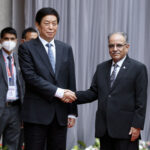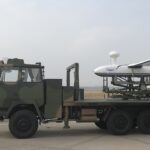Khin Zaw Win
Myanmar Scholar
As a small country sandwiched between two rising powers China and India, Nepal is located in a sensitive geopolitical situation. King Prithvi Narayan Shah, the unifier of Nepal and the first monarch of the Kingdom of Nepal, described Nepal as a “Yam between two boulders”, referring to China on the North and India (The East India Company) to the South, and suggested his successors that Nepal should try to be friends with both neighbors. Nepal is also one of the founding members of Non-Aligned Movement (NAM) since NAM was established on September 1,1961. It is wise for Nepal to adopt a very careful and balanced foreign policy and choose to be non-alignment to any major power, be it India, China or the U.S. and other western countries. But since the Deuba government came into being in July 2021, Nepal has been tilted towards India and the Western bloc. The climax is the ratification of The Millennium Challenge Corporation (MCC) Agreement with an “interpretative declaration” in the House of Representatives of Nepal on February 27, 2022.
MCC is a tool to contain China
Although MCC claims that it is an innovative and independent US foreign aid agency that is helping the developing countries to fight against poverty through economic development, MCC is widely accepted as a part of the U.S. dominated Indo-Pacific Strategy (IPS) to contain China’s Belt and Road Initiative (BRI). David J Ranz, the then assistant secretary for South Asia at the U.S. State Department, during his Nepal visit in May 2019 clearly said that the MCC was a crucial part of the Indo-Pacific Strategy. Former U.S. Vice-President Mike Pence exacerbated the situation by publicly declaring, “The Millennium Challenge Corporation is part of the Indo-Pacific Treaty designed to counter China.” The Indo-Pacific Strategy Report, published in June 2019, clearly says that support under the MCC compact is a part of the IPS and Nepal is listed as a partner country of IPS in South Asia. In short, Nepal will be employed as a tool of the U.S. to contain China.
Harms MCC will do to Nepal
First, MCC has compromised Nepal’s sovereignty. The MCC Nepal Compact section 7.1 has a provision that upon entry this compact will prevail over the domestic laws of Nepal and hence, it needs ratification from parliament.
It also has various other clauses which seriously call into question Nepal’s sovereignty such as these which states that the agreement will be terminated if the Nepalese Government “is engaged in activities that are contrary to the national security interests of the U.S.”
And of course, if termination there is, the U.S. will ask for a refund “plus interest” and it cannot use “MCC Funding, proceeds thereof or Program Assets to make such payment”. It needs to find the funds elsewhere which, for a poor country like Nepal, is not exactly easy.
In short, if the U.S. gives Nepal money, Nepal needs to behave in a way consistent with U.S. national security interests and abide by U.S. policy. If Nepal doesn’t, the U.S. will ask Nepal for hundreds of millions of dollars which it can’t afford. In this way, Nepal is, effectively, trapped.
Second, the auditing of the MCC supported projects can only be conducted by American rather than Nepali auditors. That is to say, even if Nepal will invest $160 million, the Nepali auditors can never know how much on earth the U.S. has granted in the MCC projects. As it is well known that foreign aids are usually exaggerated, it is highly suspected that the MCC projects are actually built with Nepal’s own money instead of so called $500 million U.S. grant.
Third, any current or former officer or employee of MCC enjoys extraterritoriality. The MCC has an interesting history: it was created in 2004 under President George Bush with the purpose of preventing terrorism in the post-9/11 era by attempting to use American aid to ensure “stable governments” around the world. Thus, Nepal have a U.S. agency that gives money to countries with the stated goal of countering China and clauses that force them to act in “U.S. national security interests”. If they don’t, they need to pay money that they can’t afford. This is the real reason behind the MCC is actively pursuing smaller countries to deny China. It is indeed. They can practically murder someone and get scot free.
They can actually do what CIA did in Nepal’ s northern Mustang district in 1960s to train the Dalai Lama’s Tibetans separatists this time again and Nepal can’t stop them like last time.
A fig leaf to save faces
In separate phone calls to Nepali Congress president and prime minister Deuba, Maoist Center Chairman Pushpa Kamal Dahal “Prachanda” and United Marxist-Leninist Chairman K. P. Oli, Assistant Secretary of State Donald Lu threatened them that if the MCC was not approved, it would be because of China, and the US will take strong action against the growing corruption and human rights violations in Nepal, and will consider to take financial sanctions against Nepal. Deuba, Prachanda, Oli and other leaders are almost all corrupt. According to sources, the U.S. has paid a lot of money to buy these major leaders and all of them are controlled in American hands. Prachanda is even more worried about being held accountable by the Americans for war crimes and human rights violations for the deaths and disappearances of people during the decade-long People’s War. Sapkota, the current speaker, has been sued for murder by the families of victims since before he took office.
Prachanda and Madhav Nepal kneeled down to the pressure of imperialism and agreed to support MCC ratification with a “interpretative declaration”.
During the debates in the House, Gagan Thapa, the Congress general secretary, said the government should come up with the interpretative declaration, clarifying concerns raised by some parties and members of the public. He said, “If the U.S. government refuses to accept our interpretative declaration, the MCC won’t be implemented. We should express our commitment to annulling the agreement within a minute if the other party goes beyond our interpretative declaration.”
Actually, the “interpretative declaration” is just a fig leaf for Prachanda and Madhav Kumar Nepal to save faces while they chose to betray Nepal’s national interests. It can be of no worth to stop the U.S. from trying to pull Nepal into the Indo-Pacific strategy when the U.S. refuses to make any amendment and revision in the MCC agreement.
Another consideration is that it would be “suicidal” for Nepal if the House rejects the compact as it would have lasting consequences for the Nepal-U.S. diplomatic relationship. There are several instances of the U.S. partially or fully terminating compacts for various reasons. The compacts for Madagascar and Mali were terminated fully while those in Nicaragua and Honduras were partially withdrawn. In Mali, the termination followed the late-March military coup.
A way out
All patriots in Nepal should be well aware in mind that Nepal can never be a playground of world powers’ competition and Nepalese should try their best to make the country a platform for cooperation between China and India, the U.S. and other western countries. Even if now, Nepal is one of the poorest countries in the world, it has kept a rather friendly relationship with all major countries. Nepal should make all foreign aids in accordance with its national interests, at least make sure that they can never harm the interests.
After the MCC, the State Partnership Program (SPP) military pact has also triggered controversies and major political parties are involved in the blame games to defame each other to be a traitor of the country. Even if the Deuba cabinet decided to withdraw from the SPP pact on June 21, but the Foreign Ministry had not written to the government of the U.S. to inform that decision over one month later. It is believed that the abrupt, two-day visit of U.S. Assistant Secretary of State for South and Central Asian Affairs Donald Lu to Nepal that started on July 28 largely aims to push for the controversial SPP. Under great pressure from the parliament and the whole society’s strong opposition, the foreign minister finally announced on July 29 that the written document about the decision that Nepal is not taking ahead the SPP has been sent to the U.S. Government through the diplomatic channel on July 25.
Nepal is a peace-loving country and wants all friends and no enemy. Nepal needs foreign aids but it will definitely say no to any harm in the name of aid. All major political parties should unite to stop MCC from making Nepal a playground of big powers’ competition. What Nepal needs is: Only economic development help, no military interference.




